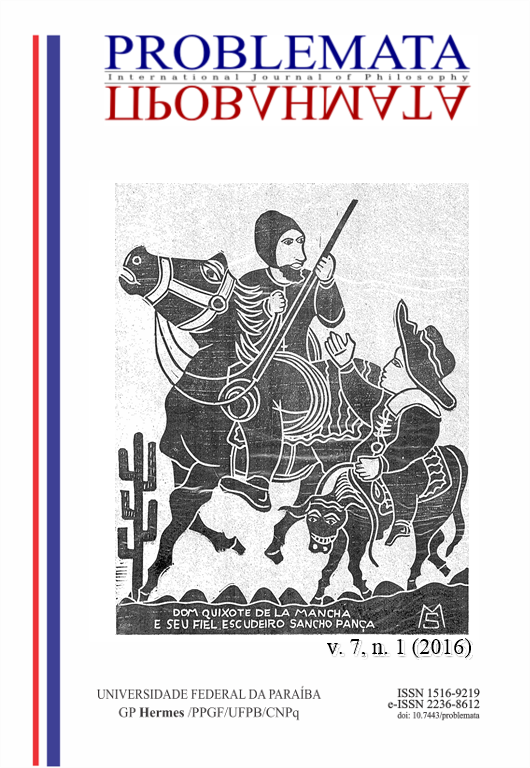VAN FRAASSEN E A INFERÊNCIA DA MELHOR EXPLICAÇÃO
DOI:
https://doi.org/10.7443/problemata.v7i1.28034Keywords:
inferência da melhor explicação, realismo científico, Bas van Fraassen.Abstract
Construído de modo a estabelecer uma justificativa epistemológica para a crença na verdade de teorias cientificas bem sucedidas, bem como para a legitimação das inferências científicas de entidades inobserváveis, o argumento realista da inferência da melhor explicação recebeu diversas críticas. Dentre elas destaca-se a crítica do filósofo empirista Bas van Fraassen, que não considera que o argumento forneça o suporte filosófico desejado pelos realistas, e portanto a crença suscitada por uma teoria científica bem sucedida deve se limitar aos seus aspectos observáveis. Para realistas, a crítica de van Fraassen, por estar baseada em sua concepção empirista, não tira do argumento suas virtudes epistemológicas. Contudo, argumentaremos neste artigo, a crítica de van Fraassen ao argumento da inferência da melhor explicação possui três dimensões distintas e portanto não se baseia somente em sua concepção empirista.
Downloads
References
BIRD, Alexander. Inferência da Única Explicação. Cognitio, São Paulo, v. 15, n. 2, p. 359-374, 2014.
BUENO, Otávio. O Empirismo Construtivo: uma reformulação e defesa. Campinas: Unicamp, 1999.
CHIHARA, Charles; CHIHARA, Carol. A Biological Objection to Constructive Empiricism. British Journal for the Philosophy of Science, Oxford, v. 44 p. 653-658, 1993.
DEVITT, Michael. Realism and Truth. (Segunda Edição). Princeton: Princeton University Press, 1997.
FRANKLIN, Allan. There are no Antirealists in the Laboratory. In: COHEN, R.S.; HILPINEN, R.; RENZONG, Q. (Org.) Realism and Anti-Realism in the Philosophy of Science, 1996, p. 131-148.
HARMAN, Gilbert. The Inference to the best Explanation. Philosophical Review, Durham, 74, p. 88-95, 1965.
LIPTON, Peter. O melhor é bom o suficiente? Princípios, Natal, vol. 17, n. 27, p. 313-329, 2010.
NEWTON-SMITH, WILLIAM. Berkeley’s Philosophy of Science. In: FOSTER, J.; ROBINSON, H. (Org.). Essays on Berkeley. Oxford: Clarendon Press, 1985, p. 149-161.
PSILLOS, Stathis. Scientific realism: how science tracks truth. London: Routledge, 1999.
_______________ Sobre a crítica de van Fraassen ao raciocínio abdutivo. Revista Crítica, Londrina, v.6, n. 21, p. 35-62, 2000.
SMART, J.J.C. Philosophy and Scientific Realism. London: Routledge, 1963.
STANFORD, Kyle. Exceeding our grasp: Science, history and the problem of unconceived theories. Oxford: Oxford University Press, 2006.
THAGARD, Paul. The Best Explanation: Criteria for Theory Choice. The Journal of Philosophy, New Yor, v. LXXV, n. 2, p. 76-92, 1978.
VAN FRAASSEN, Bas. A imagem científica. São Paulo: UNESP, 2007.
____________________ Laws and Symmetry. Oxford: Oxford University Press, 1989.
VOLLMER, S. Two Kinds of Observation: Why van Fraassen Was Right to Make a Distinction, but Made the Wrong One. Philosophy of Science, Chicago, v. 67, n. 3, p. 355-365, 2000.
Downloads
Additional Files
Published
Issue
Section
License
Authors who publish with this journal agree to the following terms:
- Authors retain copyright and grant the journal right of first publication with the work simultaneously licensed under a Creative Commons Attribution License that allows others to share the work with an acknowledgement of the work's authorship and initial publication in this journal.
- Authors are able to enter into separate, additional contractual arrangements for the non-exclusive distribution of the journal's published version of the work (e.g., post it to an institutional repository or publish it in a book), with an acknowledgement of its initial publication in this journal.
-
- Authors are permitted and encouraged to post their work online (e.g., in institutional repositories or on their website) prior to and during the submission process, as it can lead to productive exchanges, as well as earlier and greater citation of published work (See The Effect of Open Access).





